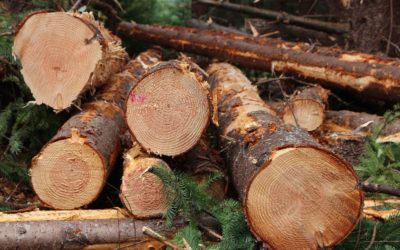COVID Relief Act Includes Loggers
Following months of political lobbying, America’s loggers finally have access to financial assistance. The Emergency Coronavirus Relief Act of 2020, passed by a bipartisan vote in both the House and Senate in late December, includes language appropriating $200 million in funding for those logging and log trucking businesses that saw a greater than 10% loss in gross revenues from January 1 through December 1, 2020 related to the COVID-19 pandemic, as compared to revenues for the same period in 2019.
Contacted a few days after President Trump signed the legislation, American Loggers Council Executive Vice President Danny Dructor was excited about its passage, though he cautioned, “We may be a ways off before we can see any money on the ground.”
Going forward, he said, two big issues are how the funds will be administered and the qualifications for receiving assistance. “The issue is the $200 million needs to go to those truly impacted by COVID,” Dructor says. Administrators may want to roll the logger relief funds into an existing program. Two potential areas are the USDA’s Farm Service Agency or more recently created USDA Coronavirus Food Assistance Program (CFAP) for agricultural producers whose operations were directly impacted by the coronavirus pandemic.
Compounding the uncertainty is the change in presidential administrations.
One of the most significant impacts of the relief fund passage is the recognition that loggers are their own industry, apart from pulp and paper or lumber. “Creating parity” between loggers and other commodity agricultural producers is a big objective that is beginning to be realized with the legislation, Dructor adds.
Another big impact is the awareness of what’s possible when people get involved. “This happened because industry came together,” Dructor emphasizes. “When loggers do stand together they can get things done, and that’s important because we had people from all over get involved, and lots of people engaged their representatives.”
According to reports, raw material delivered to mills by loggers and truckers have experienced price drops greater than 5% in 2020 compared to 2019. Third party analysis by Forest2Market reports a 6.7% (21.4 million tons) reduction in nationwide wood consumption reduced wood prices and generated a $1.83 billion (-13%) loss in revenue.
Insurance, equipment, fuel and other costs make up the vast majority of logging expenses as compared to payroll which some were able to take advantage of under the Payroll Protection Program issued earlier during the pandemic. “The amount of relief coming from the federal government is not meant to make these businesses whole, but rather to serve as a stop gap while they adjust their business plans to be able to operate under this new economy,” Dructor says.
Logging companies need to be able to take advantage of programs like other commodity producers, said ALC President Tim Christopherson of Kamiah, Id. “To see Christmas trees and other agricultural commodities and specialty crops included in the first and second versions of Coronavirus Food Protection Program (CFAP) while not including those same trees that can be turned into paper and other consumables simply did not make sense. We applaud members of Congress for recognizing and including the loggers and log haulers in this historic legislation.”
Senator Susan Collins (R-ME) secured logger relief funds in draft legislation released in December by a bipartisan coalition of members of Congress. Her provision built upon the “Loggers Relief Act” that Collins, Jared Golden (Maine second district congressman) and Rep. David Rouzer (R-NC) spearheaded earlier this year. Ultimately, the provision was retained in the final COVID relief package passed by Congress.
“This industry is built on the backs of our dedicated loggers who sustainably harvest and haul one of Maine’s most precious resources,” Collins said in a statement. “Loggers were already facing significant headwinds due to a changing 21st century economy and unfair trade practices, as well as the explosion at the Androscoggin mill in Jay and the shutdown of the paper machine at Sappi in Westbrook. COVID-19 has only compounded these challenges. Maine’s family logging and log hauling businesses need our support.”
“Maine loggers don’t want a handout, but they deserve the same support during tough times that we have already provided for farmers and fishermen,” Golden commented in a statement.
Latest News
Deere Introduces Beaver Saw Tooth
Expanding the portfolio of aftermarket forestry saw teeth options for its customers, John Deere offers the one-piece hardened beaver saw tooth for John Deere wheeled and tracked feller-bunchers. The new beaver saw tooth design boasts a beveled feature at each tooth tip, which helps improve tooth durability while striking materials other than wood…
Survey: Vermont Logger Damages
A survey on the damages wrought by summer 2023 wet weather and flooding shows the Vermont’s loggers took a big hit in business damages. Wet summer weather affected many Vermonters who work on the land, and loggers were no exception, say state officials…
WANT MORE CONTENT?
Spanning seven decades since its inception in 1952, Timber Harvesting highlights innovative and successful logging operations across the U.S. and around the world. Timber Harvesting also emphasizes new technology and provides the best marketing vehicle for the industry’s suppliers to reach the largest number of loggers in North America and beyond.
Call Us: 800.669.5613


